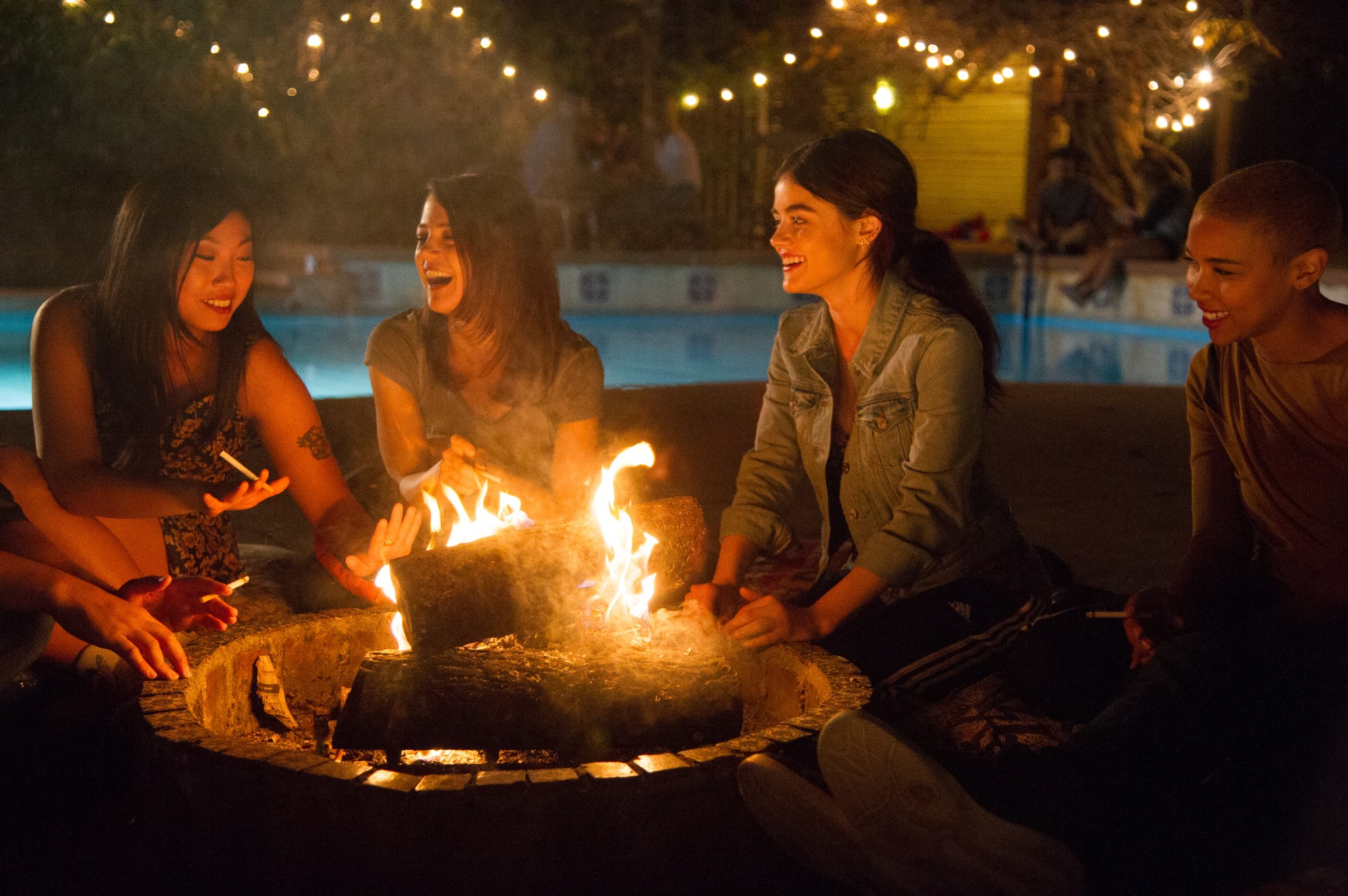For such a significant period in life as high school, most female roles in coming-of-age films set during this four-year-stretch have remained disproportionately one-dimensional. Well now, thanks to Olivia Milch — the writer and director of DUDE, which was released on Netflix on 4/20 — there’s at least one high school coming-of-age film out there that women can identify with.
Starring Lucy Hale, Kathryn Prescott, Alexandra Shipp, and Awkwafina, DUDE follows four best friends during their last year of high school. And these girls are as real as the Rorschach-like designs in their period blood stains. “To paraphrase Walt Whitman, ‘We are large—we contain multitudes,’” Olivia Milch says. It’s a quote that came to my mind quite a few times while watching DUDE, and one that seems to lie at the heart of the film.
The movie opens with the girls hot-boxing a car, to the tune of Dr. Dre’s “The Next Episode,” right before stepping out and walking to a house party, with Shipp rhetorically wondering “where the dick at” as Nate Dogg (RIP) implores encouragingly, “Hey, hey, hey, hey / Smoke weed every day.” But what might first appear to be a female stoner movie evolves into so much more when Chloe’s older brother dies at the end of their junior year and the girls’ Northern California lives start to crumble.
When asked what compelled her to make this movie, Olivia says she always “wanted to see a film that showed how complicated, funny, nuanced, and brilliant young women are,” especially during this period in life when they’re struggling to figure shit out. “Which for many of us,” Olivia adds, “happened while getting high in our cars.” In other words, she yearned to see herself — and the women she grew up with—on screen: real, fully-formed women — messy yet tidy, jealous yet chill, vulgar, horny, and, most of all, contradictory. And real women is what she brought.
More than a female stoner movie, DUDE gives voice and credence to young women everywhere. Women who don’t fit into any one tidy box. Unless, of course, that box is hot.
When did you know you wanted to make this movie?
We are so lucky now to have a wealth of female voices telling stores that accurately reflect our experience, but [before DUDE] I had never seen the female stoner comedy and coming-of-age film that felt true to my experience, so after college when I got into screenwriting, I decided to try to tell that story.
Would you consider DUDE to be biographical?
DUDE is loosely inspired by experiences that I and many incredible women I know have gone through in our lives. I spent a lot of time [during high school] in my car, laughing and crying with my girlfriends while we tried to sort through life and what it meant to grow up — while smoking a lot of weed — so in that sense, it is biographical.
Why do you feel it’s important for women to be represented in the stoner community?
We so rarely get to see female stoners — or women smoking weed at all — in film and television. Movies like Smiley Face and TV shows like Broad City are of course wonderful exceptions, but for the most part it is an underrepresented community. Weed changed my life and is one of the sacred communal acts I share with the women I love. I wanted to see a film that didn’t demonize weed, but celebrated all the ways it is naturally and organically part of our lives. I made DUDE in part because I wanted, and felt we deserved, a stoner comedy for women that authentically and accurately told our story.
Representations of stoners tend to be pretty reductive and one-dimensional. And female characters in general are often defined as one thing — and often defined in relation to the male characters around them. I wanted to see young women who were smart, kind, funny, and dealing with the real issues in life —[all while] authentically exploring being adults, which for many people means testing the boundaries of drugs and sex. I wanted to see young women who defined themselves, and who could proudly include whatever they want in that definition.
I really loved the way you lifted the curtain on girls in general, and the “gross” things they often talk about in private. I think I counted the word “dump,” for instance, three times. Was this a conscious decision?
I wanted to hear young women speak to each other the way we actually speak to each other. Vulgarity, profanity, bodily functions — it’s all part of being a fully-realized woman and human. Young women are wickedly funny and keenly observant — and that most definitely includes commenting on bodily functions.
I feel like DUDE was borne of a desire to see the messier side of the lives of high-school girls.
How do you usually celebrate 4/20?
My favorite 4/20 was attending a cannabis feast cooked by some friends in college. There was straight-up weed-lamb! This 4/20 I celebrated watching DUDE with my best friends and the people I love (while sucking on some weed honey sticks by Budhive) — so that was pretty great.
You can stream DUDE on Netflix now.
